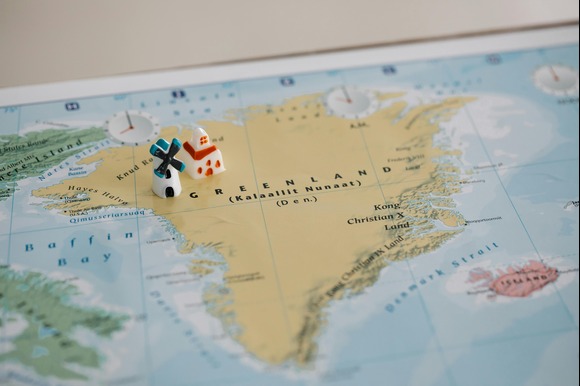US Vice-President JD Vance has criticized Denmark for allegedly leaving Greenland exposed to potential threats from China and Russia, urging its residents to “negotiate a deal” with the United States.
During his visit to the Arctic island, Vance downplayed recent remarks made by US President Donald Trump regarding the possibility of forcibly acquiring the territory. He encouraged the people of Greenland to break away from Denmark, which has governed the island for over three centuries, claiming that the Danish government has not sufficiently invested in safeguarding the semi-autonomous region.
A recent poll revealed that a significant majority of Greenlanders oppose the notion of annexation, and the Prime Minister of Greenland has expressed that the US visit demonstrated a “lack of respect.” This visit has also drawn strong criticism from Denmark.
Lars Lokke Rasmussen, the Danish Foreign Minister, acknowledged that while Danes are receptive to criticism, they “do not appreciate the tone in which it is being delivered,” in a video message directed at “American friends.” He pointed out that the US military presence in Greenland has decreased from 17 bases in 1945 to just one, which accommodates approximately 200 soldiers, stating, “We can do more, much more, within the framework we have today… Let us do it together.”
Initially, Vance’s visit was presented as a “cultural” tour led by his wife, Usha, who was scheduled to observe a dog-sledding race. However, the visit evolved over several days due to heightened scrutiny and security concerns, with numerous protests planned. Ultimately, Vance and the Second Lady spent only a few hours in Greenland, visiting the Pituffik Space Base, a missile defense facility located in the remote northern part of the island, approximately 930 miles (1,500 km) from the capital, Nuuk.
During this brief visit, Vance took the opportunity to criticize Denmark, asserting that it must “ensure the safety of the people of Greenland from numerous aggressive incursions by Russia, China, and other nations,” although he did not elaborate further.
He specifically highlighted the interest of various countries in the region’s routes and mineral resources, noting that the island, home to 57,000 residents, is thought to possess substantial untapped mineral and oil reserves.
In his statements, Vance aimed to reassure the people of Greenland that the United States would not resort to military action to seize the island from Denmark. Instead, he encouraged Greenlanders to pursue “self-determination” and to break away from Denmark, which has governed the area since 1721.
“We believe we can negotiate a deal, in the style of Donald Trump, to guarantee the security of this territory,” Vance remarked. “We hope they will choose to collaborate with the United States, as we are the only nation that will honor their sovereignty and ensure their security,” he added, emphasizing, “Their security is closely linked to our own.”
The vice president stated that the US does not have immediate plans to increase its military presence on the ground but intends to allocate more resources, including naval vessels and military icebreakers.
“Our message to Denmark is quite straightforward,” Vance asserted. “You have not adequately served the people of Greenland. Your investment in the welfare and security of this remarkable and beautiful land has been insufficient.”
In response to Vance’s remarks, Danish Prime Minister Mette Frederiksen expressed her disagreement in a statement to the BBC. “For many years, we have stood alongside the Americans in challenging situations,” she stated. “Thus, the vice president’s characterization of Denmark is not accurate.”
She noted that Denmark has significantly increased its defense budget and plans to further enhance its investments with additional surveillance, new Arctic vessels, long-range drones, and satellite capabilities. “We are prepared – day and night – to cooperate with the Americans,” she affirmed, emphasizing that such cooperation must adhere to the necessary international regulations.
Denmark’s King Frederik has expressed his opposition to the intentions articulated by the United States. On social media, he stated on Friday, “We exist in a changed reality. There should be no doubt regarding my affection for Greenland and my bond with its people.”
Accompanying his wife, U.S. National Security Adviser Mike Waltz and Energy Secretary Chris Wright joined Vance on the trip. The temperature at Pituffik was recorded at -19°C.
Meanwhile, President Trump at the White House asserted that the U.S. required Greenland to ensure “the peace of the entire world,” citing the presence of “Chinese and Russian ships everywhere” in its waters. “We need Greenland, crucially, for international security,” he emphasized. “It is not a matter of whether we can do without it; we cannot.”
Trump further remarked that Denmark and the European Union should comprehend the situation, adding, “If they do not, we will need to clarify it for them.”
Prior to Vance’s visit, Greenland’s newly appointed Prime Minister, Jens-Frederik Nielsen, remarked that the visit demonstrated “a lack of respect for the Greenlandic people.”
In Nuuk, Greenland’s capital, some residents expressed skepticism about the U.S. overtures. Artist Karline Poulsen, speaking at a cultural center, commented, “There are various ways to communicate, but I believe President Trump’s approach is not the right one.”
Another resident, identified only as Nina, expressed her concerns about the visit, stating, “This feels rather strange, and I do not appreciate it.” Her daughter, Anita, added that the visit has generated “a lot of uncertainty and many people are anxious.”
Since 2009, Greenland has had the authority to initiate an independence referendum, and in recent years, some political factions have increasingly advocated for one.
Greenland manages its internal affairs independently, while foreign and defense policies are determined by Copenhagen. Among the six major political parties that participated in this month’s election, five advocate for independence from Denmark, although they differ on the timeline for achieving it.
During his first term, Trump initially proposed the idea of purchasing Greenland, and his interest in the island has intensified over time. Russian President Vladimir Putin remarked on Thursday that he views Trump’s intentions regarding Greenland as “serious.” He expressed apprehension that “NATO countries, in general, are increasingly viewing the Far North as a potential conflict zone.”
Qupanuk Olsen, a politician from the pro-independence party Naleraq, conveyed to the BBC that Greenland is taking the United States’ interest very seriously. “We fear the possibility of being colonized again. For the past 300 years, we have been a colony under Denmark, and it still feels that way,” Olsen stated. “Now, another potential colonizer is showing interest in us.”
Troy Bouffard, a professor at the University of Alaska specializing in Arctic security, informed the BBC that Trump is relying on his business acumen to achieve his objectives in the region, rather than focusing on geopolitics or diplomacy. “If you approach this issue solely from a diplomatic perspective, you may overlook other avenues the US could explore to facilitate negotiations or compromises among the key players,” he explained.
Professor Bouffard indicated that the ultimate goal for the US is to establish a “much more robust relationship” with Greenland. One possible scenario he mentioned involves removing Denmark from the equation and allowing the US to forge a direct relationship with Greenland that supersedes Denmark’s role. He suggested that it is conceivable for the US to alter the nature of its relationship with Greenland and assume certain responsibilities typically held by Denmark.






